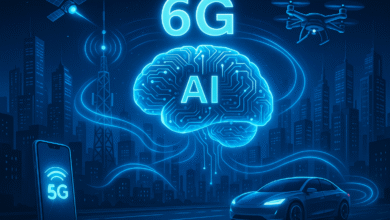
Artificial Intelligence (AI) has rapidly become a game-changer in the healthcare industry, ushering in a new era of patient care. With its ability to process vast amounts of data quickly and efficiently, AI is revolutionizing how medical professionals diagnose, treat, and manage patient health. In this article, we’ll explore the multifaceted impact of AI on healthcare, from diagnostics to personalized treatment plans, administrative efficiency, and beyond.
Read More: The Future of UK Healthcare: How Technology is Transforming Medicine
AI in Healthcare: Revolutionizing Patient Care

In recent years, AI has emerged as a powerful tool in healthcare, transforming traditional approaches to patient care. The integration of AI technologies holds the promise of improving diagnostic accuracy, personalizing treatment plans, and streamlining administrative tasks, ultimately enhancing the overall healthcare experience for both providers and patients.
The Role of AI in Diagnostics
One of the primary areas where AI is making significant strides is in diagnostics. Medical imaging, a crucial aspect of disease detection, has witnessed enhanced accuracy with the integration of AI algorithms. Through machine learning, AI systems can analyze complex medical images, aiding in the early detection of diseases such as cancer, cardiovascular issues, and neurological disorders.
Personalized Treatment Plans
AI is not only revolutionizing diagnostics but is also playing a pivotal role in tailoring treatment plans based on individual patient data. This approach, known as precision medicine, takes into account genetic, environmental, and lifestyle factors to create targeted and effective treatment strategies. The result is improved outcomes and a more patient-centric approach to healthcare.
Efficiency in Administrative Tasks
Beyond clinical applications, AI is streamlining administrative tasks within healthcare settings. By automating paperwork, appointment scheduling, and billing processes, AI contributes to the efficiency of healthcare operations. This not only saves time for healthcare professionals but also reduces operational costs, allowing resources to be redirected towards patient care.
AI-Powered Virtual Health Assistants
Imagine having a virtual health assistant at your fingertips, providing real-time health information, answering queries, and offering guidance on maintaining a healthy lifestyle. AI-powered virtual assistants are making this a reality, enhancing patient engagement and promoting proactive healthcare management.
Challenges and Ethical Considerations
While the benefits of AI in healthcare are substantial, challenges and ethical considerations loom large. Ensuring data privacy and security is paramount, especially when dealing with sensitive patient information. Additionally, concerns about job displacement due to automation require careful consideration and proactive measures to address workforce transitions.
AI in Drug Discovery and Development
The traditional drug discovery and development process is time-consuming and costly. AI is transforming this landscape by accelerating research through machine learning algorithms that analyze vast datasets to identify potential drug candidates. This not only speeds up the development process but also increases the likelihood of discovering novel and effective treatments.
Telemedicine and Remote Monitoring
The rise of telemedicine, amplified by AI, has become a cornerstone of modern healthcare. AI facilitates remote consultations, enabling patients to connect with healthcare providers from the comfort of their homes. Moreover, continuous remote monitoring of patients’ health, made possible by AI, allows for proactive intervention and timely adjustments to treatment plans.
AI for Predictive Analytics
AI’s predictive analytics capabilities are instrumental in forecasting disease outbreaks and identifying high-risk patient populations. By analyzing historical data and real-time information, AI contributes to more effective public health strategies, helping to prevent the spread of diseases and allocate resources strategically.
Enhancing Medical Research
In the realm of medical research, AI serves as a valuable ally. Its ability to analyze vast datasets quickly and identify patterns contributes to breakthroughs in understanding diseases, developing new therapies, and improving overall healthcare outcomes. The synergy between AI and human researchers is propelling the pace of medical advancements.
The Future of AI in Healthcare

As technology continues to advance, the future of AI in healthcare holds exciting possibilities. Anticipated advancements include more sophisticated diagnostic tools, AI-powered robotic surgery, and further integration of AI into everyday healthcare practices. These innovations have the potential to reshape global healthcare systems, making them more accessible, efficient, and patient-focused.
Collaboration Between Healthcare Professionals and AI
It’s essential to view AI as a tool that augments the capabilities of healthcare professionals rather than a replacement. The collaboration between human expertise and AI technologies creates a symbiotic relationship, where each contributes its unique strengths to provide the best possible patient care. Striking this balance is crucial for maximizing the benefits of AI in healthcare.
Overcoming Skepticism and Building Trust
As AI becomes increasingly integrated into healthcare, overcoming skepticism and building trust are critical factors. Addressing concerns from both healthcare professionals and patients about the reliability and effectiveness of AI technologies requires transparent communication, evidence-based demonstrations, and ongoing education. Building trust is a gradual process that involves showcasing the positive impact of AI on patient outcomes.
Government Regulations and Standards
To ensure the responsible and ethical use of AI in healthcare, government regulations and standards are imperative. Establishing clear guidelines for the development, deployment, and monitoring of AI technologies within the healthcare sector is essential. This regulatory framework helps safeguard patient privacy, maintain ethical practices, and mitigate potential risks associated with AI in healthcare.
Read More: The Science Behind Groundbreaking Medical Innovations
FAQs
- Is AI replacing healthcare professionals? No, AI is designed to complement and augment the capabilities of healthcare professionals, not replace them.
- How is patient data protected in AI-powered healthcare systems? Robust measures, including encryption and strict access controls, are in place to safeguard patient data in AI-powered healthcare systems.
- What are the ethical considerations of using AI in healthcare? Ethical considerations include ensuring patient privacy, addressing biases in algorithms, and transparent communication about AI’s role in patient care.
- Can AI predict disease outbreaks accurately? Yes, AI’s predictive analytics capabilities contribute to accurate forecasting of disease outbreaks by analyzing historical and real-time data.
- How can healthcare professionals and patients build trust in AI? Trust is built through transparent communication, evidence-based demonstrations of AI effectiveness, and ongoing education about the benefits and limitations of AI in healthcare.
The Final Words
AI’s role in healthcare is transformative, revolutionizing patient care across various aspects of the healthcare ecosystem. From diagnostics to treatment, administrative efficiency, and beyond, AI is reshaping the way healthcare is delivered and experienced. As we navigate the evolving landscape of AI in healthcare, it’s crucial to embrace the potential while addressing challenges to ensure a future where technology enhances the human touch in healthcare.








2 Comments